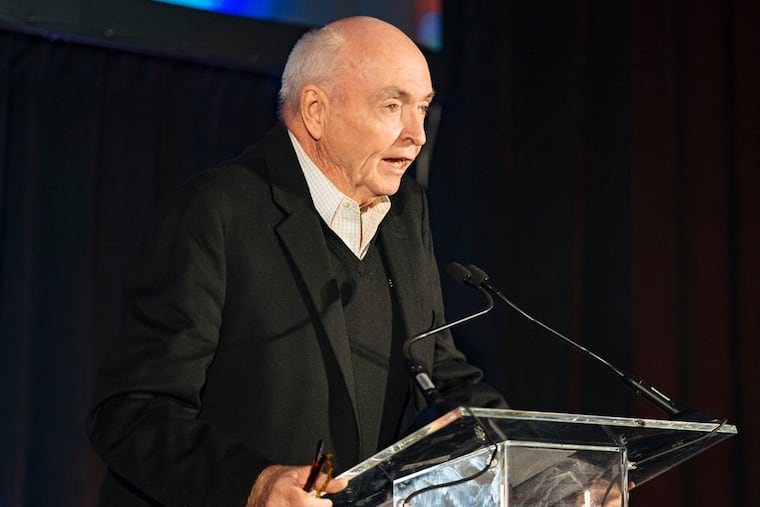Harry Donahue, a familiar voice from KYW and Temple radio, has a 70-year-old virus story to tell
Donahue was stricken with polio at the age of 2. A vaccine came years later. His parents and friends never treated him like a victim.

Over the weekend, Harry Donahue sat in his den in Southampton, Bucks County, “hunkered down a little bit and hoping for better times.” Sitting there, the longtime Temple sports radio play-by-play man thought back to a time when the world frantically searched for another vaccine, and it didn’t arrive quite in time to help Harry Donahue.
Donahue is not the “woe is me" type. If people ask him about his uneven gait, he usually just tells them he’d tripped over something the other day.
He used to tell the truth, Donahue said, but he didn’t want people feeling bad, hearing this guy had been stricken with polio when he was 2 years old, so he found it easier to tell a version of a white lie.
His friends and family knew. What Donahue thought about in his den, this global coronavirus pandemic spreading -- he wished his own parents were still alive, so they could tell his nine grandchildren a little about what it was like to have a 2-year-old with a virus that killed hundreds of thousands of people, before this man named Jonas Salk developed a vaccine, available a half-decade after Harry’s diagnosis.
He thinks his parents could calm everybody down a bit, let them know about the sunny days off in the distance.
Donahue has one of the most familiar voices in this city. He had been KYW Radio’s morning man for 35 years until his 2014 retirement. He still is the radio voice of Temple football and basketball, put in Temple’s athletic ring of honor earlier this year.
Thinking about how his own parents handled everything in 1950, Donahue put some words to paper -- or to a screen -- sending his thoughts to friends.
“I still have memories of lying in a bed in Philadelphia’s Municipal Hospital," Donahue wrote. “My parents were allowed brief visitations over the course of the month I was in there. They and my brother were in semi-quarantine in our home …”
Home was in the Olney section of Philadelphia.
“... as I lay in that hospital room with as many as four other children who had been diagnosed with the virus.”
Let’s stop and imagine the fear Donahue’s parents must have had. Polio was a killer, and Donahue noted that his later research showed the number of cases in Philadelphia in 1950 was the highest in history. He noted how the trust they had to place in medical professionals was immense.
“I vividly recall when they would bring with them toys and stuffed animals. I even remember them waving goodbye to me when their visits would end. And sometimes one or two of the older children in the room would try to get my attention by calling me a ‘dumbbell.’ Chalk it up as my first experience with bullying.”
That’s not the message Donahue wanted to pass on. He made it out of the hospital. Two years later, the braces on his legs came off.
“My parents never helicoptered me," Donahue said over the phone. “I think it left an impression. To try everything you can. Grind it out every day. Don’t fall back on, ‘You know what, I’m a polio victim, I shouldn’t be expected to do this …’ ”
Stickball, touch football, basketball -- whatever the neighborhood kids played, Harry played.
“They normalized every bit of my life," Donahue said. “They refused to overprotect me. They were survivors in every way. Children of the Depression whose own parents had taken on the loss of jobs and businesses and came out those tunnels ready for the next challenge.”
And he knew that limp, and surgeries he endured, didn’t compare to the girl three blocks away, a bit older, sentenced by polio to a wheelchair for her shorter life.
Donahue isn’t a “get off my lawn” type any more than “woe is me.” He just knows his parents hid their scars and their fears raising him.
“A silent demonstration of hope, trust and love," Donahue wrote in his essay. “That is the legacy of Betty and Harry Donahue and the legacy of thousands like them.”
If that can inspire parents today, Donahue added, all good. It inspired Harry his whole life.
“I have to believe somewhere there are parents just like you," Donahue wrote. “Similar in their own way at being that guiding light to their children, family and friends.”
That limp? Harry just tripped over something the other day. He’s fine, ready to wait out this virus, then get back on a golf course, reschedule that trip to Florida he was supposed to take with friends. Don’t worry about him.